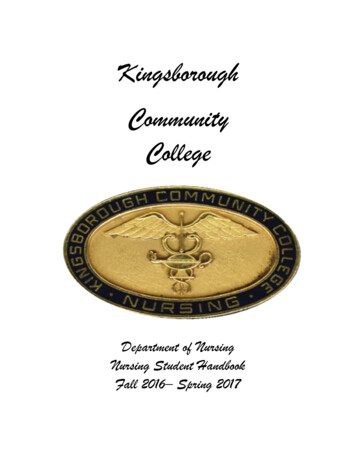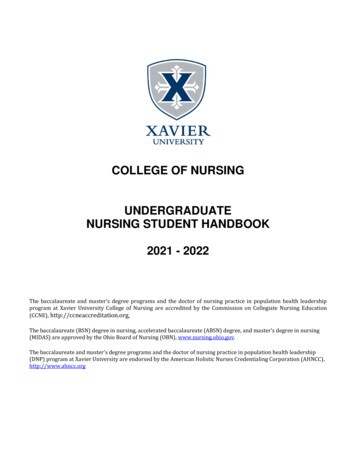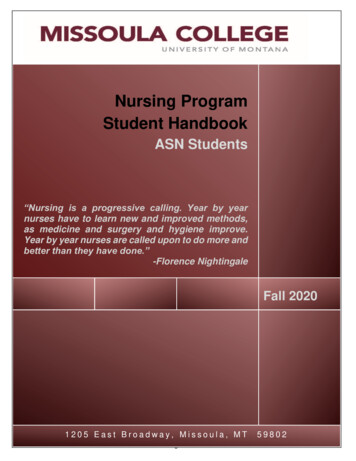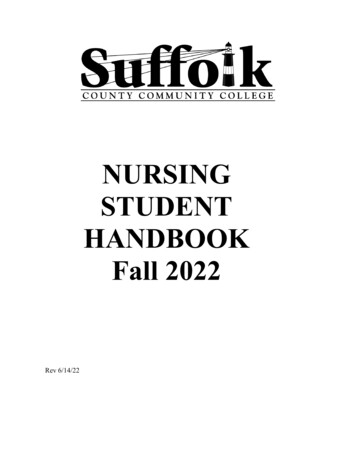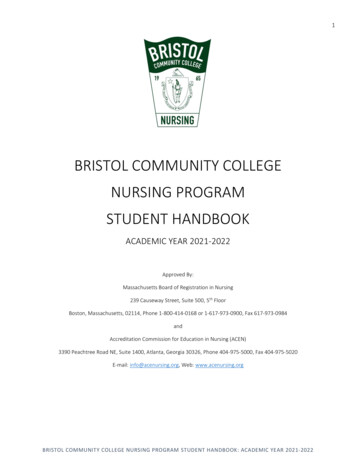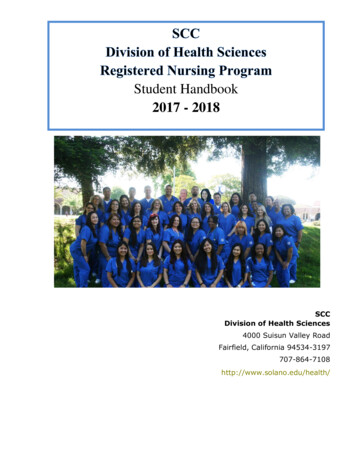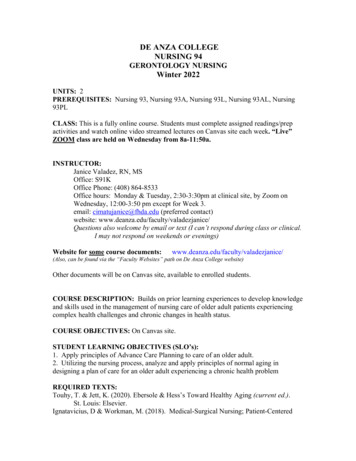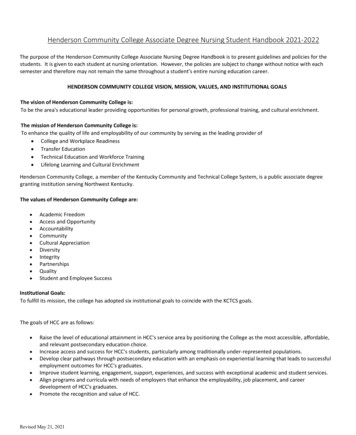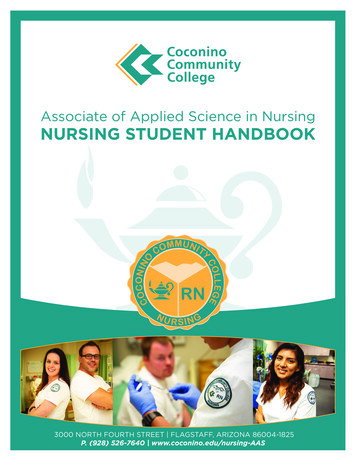
Transcription
Associate of Applied Science in NursingMMUNITOCYCORNNULLE GEC O NI NCOONURSING STUDENT HANDBOOKR SIN G3000 NORTH FOURTH STREET FLAGSTAFF, ARIZONA 86004-1825P. (928) 526-7640 www.coconino.edu/nursing-AAS
Table of ContentsCOCONINO COMMUNITY COLLEGE MISSION STATEMENTNURSING DEPARTMENT MISSION/VISIONPHILOSOPHYNURSING PROGRAM GOALSNURSING PROGRAM OUTCOMESEND OF PROGRAM STUDENT LEARNING OUTCOMES (EPSLO)STUDENT LEARNING OUTCOMES BY COURSEPROGRAM CONCEPTUAL FRAMEWORK AND COMPETENCIESASSOCIATE IN APPLIED SCIENCE NURSING DEGREE PROGRAM OF STUDYNursing Course OutlinesADMISSION, PROGRESSION, WITHDRAWAL, DISMISSAL, AND READMISSION POLICIESAdmissionNew Student ionTransfer Students/Advanced PlacementAdvisorsGRADUATION REQUIREMENTSHEALTH REQUIREMENTSDocumentationPolicy Related to Pregnancy, Medication, and other Health Related ConcernsBlood and Body Fluid/Needle-Stick Exposure ProtocolGIFTSACADEMIC POLICIESCode of ConductProfessionalismRespectful BehaviorAcademic Honesty/IntegrityCell Phone and Social Media UseDress CodeARIZONA NURSE PRACTICE ACT and SAFE PRACTICE POLICYR4-19-403 Unprofessional ConductMedication AdministrationOccurrencesChain of CommandStudent AppealsCRIMINAL BACKGROUND CHECKINTERPRETATION OF FELONY BAR STATUTES"Felony bar" cases:SUBSTANCE ABUSEATTENDANCE POLICYACADEMIC GRADING POLICYGrading ScaleAcademic NotificationAssessment Technologies Institute (ATI)TECHNOLOGY REQUIREMENTSCLINICAL REQUIREMENTSScheduling of Clinical Rotations[1]Updated 7/19/2022 5161616161717171717181919191920
Communicating with Clinical FacilitiesSupervision During ClinicalClinical Grading PolicyPersonal Belongings in the Clinical SettingInsuranceMissed Clinical ExperiencesWorking Prior to Clinical RotationsSTUDENT RIGHTS AND RESPONSIBILITIESStudent Participation in Program/Student RepresentativesStudent EvaluationsCOMMUNICATIONSNOW DAYSSTUDENT SAFETYAPPENDIX A: Coconino Community College Policies (not a complete list)Procedure on Screening for Use of Alcohol and DrugsAPPENDIX B: Nursing Course OutlinesAPPENDIX C: Clinical and Simulation Information and OutcomesTechnology in Simulation and Clinical SettingsSimulation Lab Student Learning OutcomesClinical OutcomesAPPENDIX D: Nursing Technical Standards/Functional AbilitiesAPPENDIX E: Minimal Knowledge and Skills/Scope of PracticeAppendix F: Guidelines for Student Leaders (Representatives)Appendix G: Nursing Program CostsAppendix H: Clinical Evaluation Tool[2]Updated 7/19/2022 39
COCONINO COMMUNITY COLLEGE MISSION STATEMENTCoconino Community College is committed to providing accessible and affordable educational programs thatprepare students for the future. Deeply engaged with the communities we serve, we promote student successthrough a welcoming and inclusive learning environment designed for innovative programming, career andworkforce development, university transfer education, and continued life-long learning opportunities.NURSING DEPARTMENT MISSION/VISIONThe CCC nursing program’s mission is to build a professional, safe and diverse nursing workforce to advance thehealth of our local, national, and global communities through nursing’s core values of caring, integrity, diversity andexcellence.PHILOSOPHYThe nursing faculty shares the mission and vision of Coconino Community College. Nursing faculty hold the beliefthat nursing is an art and science. A complete nursing education curriculum integrates knowledge from thesciences and humanities. Nursing faculty are committed to contributing to the profession through teaching andmaintaining knowledge of current nursing practice and educational methods. The nursing faculty recognizes thatnursing students are unique, have individual learning needs and their engagement with students contributes tothe learning experience. Active student participation, which includes setting personal goals and taking ownershipof program content and skills mastery, is essential to their success.NURSING PROGRAM GOALS1.2.3.4.Provide the community an economically feasible way to advance a career in healthcare.Improve student learning by providing students with innovative teaching strategies.Engage with students to promote retention within the nursing program.Empower students to create and achieve goals throughout the nursing program.NURSING PROGRAM OUTCOMESThe nursing program measures student success after completion of the program. The following areas are tracked andevaluated.1. NCLEX-RN pass rates2. Program completion rate3. Employment ratesEND OF PROGRAM STUDENT LEARNING OUTCOMES (EPSLO)The student will be able to:1. prioritize care for multiple patients.2. demonstrate technical skills required of a registered nurse.3. incorporate current evidence into clinical practice.4. demonstrate patient, self, and environmental safety.5. demonstrate professional, ethical and legal behaviors of a registered nurse.6. utilize the nursing process effectively to provide client- centered care.7. integrate healthcare technology into clinical practice.8. function effectively within nursing and interprofessional teams.End of Program Student Learning Outcomes are determined by various means of assessment including, but notlimited to skills lab, case studies, virtual simulation, high fidelity simulation, clinical, quizzes/tests, concept maps,assignments, and care plans.[3]Updated 7/19/2022 KC
STUDENT LEARNING OUTCOMES BY COURSEEPSLONUR 116NUR 124NUR 215NUR 220prioritize care for multiple patientsidentify frameworks for prioritizingclient care.apply prioritizing frameworks tocare for patients in an adultmedical-surgical setting.apply prioritizing frameworks tocare for the mental health,pediatric, newborn and childbearingfamilies.demonstrate the ability to prioritizecare for multiple complex patients.demonstrate technical skillsrequired of a registered nursedemonstrate competence inperforming nursing skills in the skillslab.demonstrate competence inperforming supervised nursing skillsin an adult medical-surgical setting.demonstrate competence inperforming nursing skills for mentalhealth, pediatric, newborn andchildbearing families.demonstrate proficiency oftechnical skills for multiple complexpatients.incorporate current evidence intoclinical practiceapply evidence-based practice toclient care.apply evidence-based practices incaring for patients in an adultmedical surgical setting.apply evidence-based practices incare of mental health, pediatric,newborn and childbearing families.integrate current evidence intoclinical practice for multiplecomplex patients.demonstrate patient, self, andenvironmental safetyidentify the safety needs of patientsand nurses.demonstrate safe practices in theadult medical-surgical setting.demonstrate safe practices in themental health, pediatric, andmaternal-newborn settings.manage the safety needs ofcomplex patients and thehealthcare team.demonstrate professional, ethicaland legal behaviors of a registerednurseidentify ethical and legal behaviorsof a nurse.demonstrate ethical and legalbehaviors of a nurse in an adultmedical surgical setting.Demonstrate ethical and legalbehaviors of a nurse with mentalhealth, pediatric, newborn andchildbearing families.demonstrate the ethical and legalbehaviors of a nurse in themanagement of complex patients.utilize the nursing processeffectively to provide clientcentered caredemonstrate the ability toformulate a plan of care based onaccurate client assessment.apply the nursing process to provideclient-centered care in the clinicalsetting.apply the nursing process to provideclient-centered care with mentalhealth, pediatric, newborn andchildbearing families.utilize clinical reasoning principlesto formulate and implement aclient-centered plan of care forcomplex patients.integrate healthcare technologyinto clinical practiceutilize technology appropriately inclient care.utilize appropriate technology whilecaring for patients in adult medicalsurgical settings.utilize appropriate technology whilecaring for mental health, pediatric,newborn and childbearing families.utilize appropriate technology whilecaring for complex patients.function effectively within nursingand interprofessional teamsreport on therapeuticcommunication styles of otherhealthcare professionals.demonstrate collegiality andteamwork with nursing andinterprofessional teams in an adultmedical surgical setting.demonstrate collegiality andteamwork with nursing andinterprofessional teams for mentalhealth, pediatric, newborn andchildbearing families.functions effectively within nursingand interprofessional teams tofoster communication,collaboration, mutual respect, andshared decision making.[4]Updated 7/19/2022 KC
EPSLONUR 114prioritize care for multiple patientsNUR 222assess priorities in patient management.demonstrate technical skills required of a registerednurselist the eight rights of medication administration.evaluate the role transition from student to professionalnurse.incorporate current evidence into clinical practiceexplain the application of current evidence for use withmedicine administration.validate sources of current evidence for nursingpractice.demonstrate professional, ethical and legal behaviorsof a registered nurseidentify accountability, ethical and legal responsibilitiesof the professional nurse related to safe drugadministration.evaluate professional, ethical, and legal behaviors of aregistered nurse.utilize the nursing process effectively to provide clientcentered careaddress indications, routes, side effects, and adverseeffects of medications introduced in this course.integrate healthcare technology into clinical practicediscuss the role of technology in client care.function effectively within nursing andinterprofessional teamsdistinguish the roles of the hospital pharmacists, healthcare providers, and nurses for individualization ofpharmacological interventions.demonstrate patient, self, and environmental safety[5]Updated 7/19/2022 KCdistinguish among various nursing leadership skills.
PROGRAM CONCEPTUAL FRAMEWORK AND COMPETENCIESA conceptual framework provides an organizing structure for implementation of learning experiences throughout the program. Students must be able todemonstrate satisfactory performance guided by nationally recognized standards and competencies. EPSLOs were created around Quality and Safety Educationfor Nursing (QSEN). The following is a guide to competencies that students must perform to successfully complete the program.EPSLOQSENPatient-centered rate technical skills required Patient-centered careof a registered nurseEBPSafetyInformaticsincorporate current evidence intoPatient-centered careclinical practiceEBPQISafetyInformaticsdemonstrate patient, self, andPatient-centered careenvironmental safetyTeamwork/CollaborationSafetydemonstrate professional, ethicalPatient-centered careand legal behaviors of a registered Teamwork/nurseCollaborationEBPQIutilize the nursing process effectively Patient-centered careto provide client-centered tegrate healthcare technology into Patient-centered careclinical practiceQISafetyInformaticsfunction effectively within nursingPatient-centered careand interprofessional teamsTeamwork/CollaborationQISafetyInformaticsANA Standards of ProfessionalPerformanceprioritize care for multiple patientsANA Standards of NursingPracticeAssessmentPlanningImplementationNLN CompetenciesRecognize CuesAnalyze CuesPrioritize HypothesesGenerate SolutionsTake ActionEvaluate OutcomesNursing judgementSpirit of lity of practiceOutcomes rate SolutionsTake ActionEvaluate OutcomesEnvironmental healthImplementationTake ActionEvaluate OutcomesEthicsCulturally congruent practiceResource utilizationImplementationTake ActionEvaluate OutcomesProfessional identityQuality of practiceProfessional practiceevaluationAssessmentDiagnosisOutcomes ementationRecognize CuesAnalyze CuesPrioritize HypothesesGenerate SolutionsTake ActionsEvaluate OutcomesTake ActionsEvaluate OutcomesNursing judgementImplementationTake ActionsEvaluate OutcomesHuman flourishingProfessional practiceevaluationResource ource utilization[6]Updated 7/19/2022 KCClinical Judgment Model
ASSOCIATE IN APPLIED SCIENCE NURSING DEGREE PROGRAM OF STUDYCurriculum Academic Year 2022-2023General Education CoursesCredit HoursENG 101: English Composition I*3ENG 102: English Composition II*3MAT 140 (or higher): College Mathematics*3-5BIO 201: Human Anatomy & Physiology I*4BIO 202: Human Anatomy & Physiology II*4BIO 205: Microbiology4BIO 218: Human Pathophysiology4CHM 130: Fundamentals of Chemistry*4NTR 135: Human Nutrition3PSY 240: Developmental Psychology3Arts & Humanities Elective4Total General Education Credits38-40Nursing Core CoursesNUR 114: Introduction to Nursing Pharmacology3NUR 116: Nursing Concepts I5NUR 124: Nursing Concepts II9NUR 215: Nursing Concepts III9NUR 220: Nursing Concepts IV5NUR 222: Management & Leadership in Nursing2Total AAS Nursing Degree Credits77-79*Prerequisite courses required to be completed prior to entering the Nursing Program**Corequisite courses, but strongly encouraged to complete prior to entering the Nursing programNursing Course OutlinesSee Appendix BADMISSION, PROGRESSION, WITHDRAWAL, DISMISSAL, AND READMISSION POLICIESAdmissionTo be eligible to apply for admission to the Associate of Applied Science in nursing program the applicant isrequired to complete the following: Application for admission to Coconino Community College Completion of the current year’s nursing program application (available in October yearly) Submission of all official transcripts that apply to the nursing program to the CCC registrar for evaluation prior tothe application process Submission of official transcripts with the application to the nursing program (official transcripts must be in asealed envelope) and a copy of DegreeWorks[7]Updated 7/19/2022 KC
Grade of “C” or higher in all required prerequisite coursesCumulative grade point average of 3.0 on a four-point scale or higher on required pre/co-requisite coursesVerification of current Arizona Nursing Assistant (LNA) licenseSubmission of a copy of an Arizona DPS Fingerprint Card, Level 1Completion of the ATI TEAS exam with a minimum score of 66.1%Attendance to an Application Information Session (dates and times are located on the Nursing ProgramInformation webpage)New Student OrientationAll new students to the Nursing Program are required to attend a one-day orientation. Required orientationactivities must be completed and include: Review of Nursing Student Handbook and sign acknowledgement Obtain CCC student ID badge Purchase approved scrubs Set up ATI account and complete learning activity Complete plagiarism certificate Complete change of major form Tour of facility Other activities outlined by the agenda (varies from year to year)ProgressionProgression through the Nursing Program requires students to obtain a “B” or higher in each course in addition tosuccessfully passing clinical experiences.WithdrawalThe nursing program follows CCC’s procedure on Student Withdrawal (501-11). It is strongly recommended thatthe student speaks with the nursing instructor and Director of Nursing prior to withdrawing from the course.Course Withdrawal A student may initiate an official withdrawal from any course by completing the withdrawal process online usingthe student self-service system or by submitting a course drop form to the Registration and Enrollment ServicesOffice. Withdrawals must be made within the published deadlines. (See 501-03 Registration Information)It is the student’s responsibility to withdraw from any class they do not intend to complete. If a student stopsattending and does not withdraw by the withdrawal deadline the instructor will assign the earned final grade.Students are encouraged to discuss withdrawal options with their instructors and with the Office of Financial Aidand Veterans Services (if a financial aid or Veterans education benefits recipient).A grade of “W” indicates that the student withdrew from the class after the end of the drop period but on orbefore the withdrawal deadline.A grade of “W” is not calculated in the grade point average but is included in attempted hours of completion.Tuition refunds will only be processed within the refund period.Term Withdrawal of Financial Aid Students In accordance with the federal regulations (34 CFR 668.22), a student may be required to repay federal financialaid funds if they completely withdraw or are withdrawn by the College. Students are encouraged to contact theOffice of Financial Aid and Veteran Services. A Return to Title IV calculation will be determined for students who follow official withdrawal procedures as wellas for students who stop attending classes. Students may be required to return unearned Federal Grant orFederal Loan funds.[8]Updated 7/19/2022 KC
Dismissal/ReadmissionStudents who earn a grade below “B” or withdraw from any nursing course (due to failure of a course) mayrequest readmission to the nursing course; however, readmission is not guaranteed. Students may requestreadmission once during the Associate of Applied Science in Nursing program. Readmission is contingent on spaceavailability and not guaranteed. Readmission requests must be submitted in writing to the Director of Nursing. Theletter should address actions implemented to resolve the issues responsible for exiting the program. The Director ofNursing will review requests for readmission. Written requests must be submitted by April 1st for Fall semester andNovember 1st for Spring semester.Transfer Students/Advanced PlacementStudents wishing to transfer to the Coconino Community College Associate in Applied Science in Nursing programfrom another nursing program and seek advanced placement must provide the following documentation andschedule an interview with the Director of Nursing. The application process includes: Completion of Associate in Applied Science in Nursing Degree program admission requirements as outlined inAdmission requirements Completion of an application according to published procedure of the current year (this includes AZ LNA license,DPS fingerprint clearance card, and ATI TEAS test score) Submission of letter(s) from previously attended nursing program(s) verifying performance and placement intheoretical and clinical levels Submission of official transcripts of prior coursework from the nursing program and all pre/co-requisites Submission of all nursing course syllabi of classes completedThe Director of Nursing will determine eligibility and placement of the student based on evaluation of priorcoursework and information from previous program(s) prior to scheduling an interview. Acceptance is alsodependent on space available in class. If accepted, the student is required to complete documentation as outlinedin Health Requirements.Advisors Students are more than welcome to talk with nursing faculty to help with career choices.Each student is responsible for fulfilling degree requirements, but the Director of Nursing or an academic advisorcan help the student to understand academic requirements, changes in requirements, choose electives, andplan a balanced program.Advisors may also assist students to utilize the resources available at CCC, including programs for improvementof study skills, financial aid, counseling, and health care.GRADUATION REQUIREMENTSRequirements for graduation include: All co-requisite courses must be completed prior to or in sequential order listed on the curriculum outline.Students must receive a “C” or higher in all required general education and science courses and a “B” or higherin the nursing courses and successfully pass clinical rotations in order to progress through the nursing program. Successful completion of all required nursing program theory and clinical hours. Students should follow other graduation procedures as described in the Coconino Community College catalog. Graduation from the nursing program does not guarantee licensure.[9]Updated 7/19/2022 KC
HEALTH REQUIREMENTSDocumentationThe following records must be completed and on file with the Nursing Department when applications aresubmitted. Health records are required for students to participate in clinical rotations. It is the student’sresponsibility to ensure that all forms and requirements are complete throughout the nursing program. Studentsare required to keep a copy of ALL documents for their own records, as they will be required to provide these toclinical agencies prior to participating in clinical rotations. Confidential Medical History Form Negative TB skin test (must be current for the entire academic year) or a chest x-ray/other testing if skin testwas positive Evidence of two (2) measles, mumps, and rubella (MMR) vaccines OR blood titer (must be read by healthcareprovider), which shows immunity *NOTE: rubella vaccine cannot be given to pregnant women. Evidence of two (2) varicella (chickenpox) vaccines OR blood titer, which shows immunity (must be read byhealthcare provider) Hepatitis B vaccine series record or signature declining this vaccine (the administrative assistant for the NursingDepartment has a declination form) Tdap immunization within ten (10) years Flu vaccine (annually by November 1st) COVID-19 vaccine (evidence of full vaccination)Additional Documentation Required: American Heart Association BLS Provider certification Current Arizona Nursing Assistant License (LNA) DPS Fingerprint Card, Level 1Students continuing in the nursing program must update the following records prior to the start of each semesterto continue in the program and participate in clinical rotations: Health history form (if there is a change) Emergency contact information (if there is a change) Annual TB skin test, chest x-ray, or other form of tuberculosis testing AHA BLS Provider CPR certification Arizona Nursing Assistant License Flu Vaccine (annually, due on November 1st of each year) Any other health requirements implemented by clinical facilities (at any time in the school year)These requirements must be up-to-date at all times during the program. It is the student’s responsibility toprovide an up-to-date copy of these records to the Nursing Department. Failure to provide up-to-date records willresult in the student not participating in clinical rotations until the requirements have been met. If students miss clinicaldue to not having up-to-date records will receive a grade of zero for the rotations missed, and the attendance policywill be enforced.Policy Related to Pregnancy, Medication, and other Health Related ConcernsStudents who are pregnant, under the influence of medication, or other health related concerns such that wouldprevent full participation in required clinicals and other competencies of the nursing program will requireconsultation with the course faculty and/or the Director of Nursing well in advance of clinical assignment or assoon as possible. This is not excluding students, but coordinating with faculty if less than full participation in allaspects of clinical requirements cannot be met.[10]Updated 7/19/2022 KC
Blood and Body Fluid/Needle-Stick Exposure ProtocolAll exposures to blood and other potentially infectious bodily fluids must be reported immediately to the clinicalinstructor and receive medical evaluation at the student’s expense. Any student sustaining blood or bodily fluid exposure as described above may elect to have an HIV antibody testperformed at the clinical facility, where possible, or at another health care facility. All efforts will be made toprotect student confidentiality. Students desiring a higher level of confidentiality may have testing performed atthe Coconino County Health Department or private health care provider’s office. Students sustaining significant exposure to blood/bodily fluids must report it to their instructor who will notifythe immediate supervisor and complete the appropriate documents required by the clinical agency. The CCCnursing program will follow the clinical agency policy and procedure on exposure. Those exposures requiring first aid (i.e., lacerations requiring sutures) will be referred for evaluation andtreatment in the Emergency Department. Students who receive a significant exposure to a known HIV source or known Hepatitis B carrier (HbsAg positive)will be referred immediately to the Emergency Department for initial evaluation. Follow up will be theresponsibility of the student and the student’s health care provider. When a student experiences an unprotected exposure to blood/bodily fluids while in a clinical agency, thestudent should be aware that the agency policy may mandate an incident report be filed. While the nursingprogram will make every effort to maintain confidentiality, the nursing program cannot be held responsible foractions taken by the clinical agency. The Nursing Program will maintain a record of exposure incidents. If a student receives a bloodborne exposure or needle-stick during skills lab on the CCC campus, the student willbe sent for bloodborne pathogen blood draw. CCC will pay for the first lab draw, and the student will beresponsible for the cost of subsequent follow up.GIFTSStudents may not give or receive any gifts of patients/clients or their families. Students should not give or receivegifts to nursing faculty or clinical instructors.ACADEMIC POLICIESCCC has numerous policies to which students and employees must adhere. The policies that communicateexpected student conduct in class and clinical experiences are listed here. Full copies are included in Appendix Aof this handbook. Students can access CCC policies on the website (https://www.coconino.edu)Code of ConductBehavior that interferes with the orderly functioning of the college or adversely affects an individual’s pursuit ofeducation, or disrupts the learning environment is prohibited. For a complete list of prohibited behaviors, seethe College’s full Code of Conduct Procedure (503-01). Any violation of the Code of Conduct, Professionalism,Respectful Behavior, Academic Honesty/Integrity, Cell Phone/Social Media, Dress Code, Arizona Nursing Practice Act,or Safe Practice Policies, will be subject to the following discipline procedure. Violations will follow the studentthroughout the entire nursing program.1. First offense: Verbal warning will be given to the student from the instructor. Written documentation of theverbal warning will be placed in the student’s file.2. Second offense: Written letter of warning will be issued to the student. With the written warning, the student,instructor, and Director of Nursing will provide a signature, and the document will be placed in the student’s file.Students are required to create a written action plan to correct the behavior.3. Third offense: A meeting with the instructor and Director of Nursing with consideration for dismissal from theprogram.[11]Updated 7/19/2022 KC
ProfessionalismNursing professionalism occurs both inside and outside the classroom. Professionalism includes the following behaviors.Students not practicing the above behaviors will be subject to discipline (see Code of Conduct).1. Preparedness (class and clinical)2. Time Management3. Quality of Work/Accountability4. Teamwork/Leadership5. Respectful Behavior6. Ethical Behavior7. Coachability/Self-Reflection8. Emotional Intelligence9. MotivationRespectful BehaviorEveryone in the nursing program, including students, instructors and supervisors are expected to treat oneanother with kindness and respect. The following actions are considered disrespectful and exhibiting any of thefollowing behaviors may result in the disciplinary process (this is not an all-inclusive list). Gossiping Spreading rumors by any means Disrupting the learning environment Bullying Harassment Physical violence, including restriction of movement or egress Using or possessing weapons on campus or a clinical setting Theft Damage to school or personal property of another Not taking personal accountability Disrespectful communicationAcademic Honesty/IntegrityThe CCC Department of Nursing anticipates that each student will pursue studies with purpose andintegrity. If students are not living up to the expected high standard of academic integrity, the value of theeducation that they are receiving, and the nursing degree they will receive, is compromised. Nursing students willbe held accountable to the CCC Academic Dishonesty (303-11) policy. Each student’s grade should reflect only thatstudent’s achievement. The following conduct shall be deemed to violate college policy and will be subject todisciplinary action.Plagiarism is the act of appropriating another person’s written, artistic, or musical composition or portionsthereof, or ideas, language or symbols and conveying the material as the product of one’s own mind withoutgiving credit to the originator. In written work, direct quotations, statements which are the result of paraphrasingor summarizing the work of another, and other information which is not considered common knowledge must becited or acknowledged usually in the form of a footnote. Quotation marks or a proper form of identification shallbe used to indicate all direct quotations.Cheating is the act of using or attempting to use, in an examination or other academic work, material,information, or study aids, which are not permitted by the instructor. Cheating includes, but is not limited to,having another person do research, write papers, complete assignments or take exami
APPENDIX D: Nursing Technical Standards/Functional Abilities 30 APPENDIX E: Minimal Knowledge and Skills/Scope of Practice 32 Appendix F: Guidelines for Student Leaders (Representatives) 36 Appendix G: Nursing Program Costs 37 Appendix H: Clinical Evaluation Tool 39 [2] Updated 7/19/2022 KC
